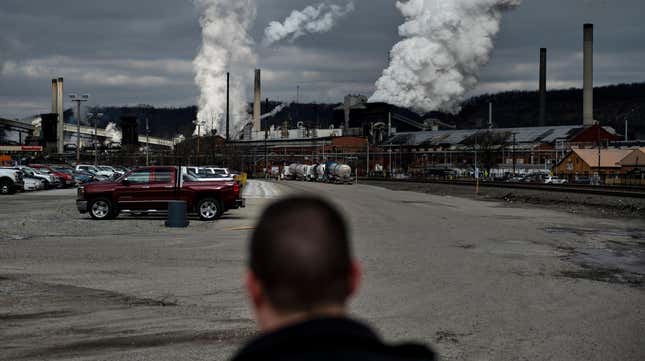
Conservatives have long argued against regulating fossil fuel production for the climate’s sake, claiming that doing so would interfere with the holy free market. A new study shows that’s a total fairy tale because the invisible hand isn’t responsible for dirty fuels’ market dominance—implicit government subsidies are. The findings show those subsidies total in the billions each year.
We often talk about the direct subsidies fossil fuel companies get from the government. Estimates range anywhere from $10 billion to $52 billion per year. But more insidious indirect subsidies also help keep fossil fuel companies in business, allowing companies to avoid paying the true price for their pollution and the other dangers they pose to society.
“We’re in a state of the world now where we have we call, in economics, inefficient pricing because the price that we pay for fossil fuels does not reflect all those costs,” Matthew Kotchen, an economist at Yale University and author of the study, said.
The paper, published in the Proceedings of the National Academy of Sciences on Monday, examines the value of implicit government support for U.S. coal, natural gas, gasoline, and diesel companies. In particular, it looks at the detrimental impacts those firms are able to offload onto society, specifically climate damages and public health effects from pollution. For gas and diesel, Kotchen also looked into the costs of car accident fatalities, congestion-based travel delays, and road damage from the use of heavy-duty vehicles that run on diesel. These are all what economists call externalities not priced into the use of fossil fuels.
“When there’s an externality, you don’t have a free market,” Kotchen said. “People think it’s a free market because it’s just the way it is and there’s no regulation.”
To quantify the value of these implicit subsidies, Kotchen employed the same method the International Monetary Fund uses to estimate the “social cost” of producing each fuel—or the price society pays to deal with these externalized costs. He did this for every year between 2010 and 2018, finding the specific cost per gallon, ton, or barrel for each fuel. Kotchen then used U.S. federal data to see how much fuel U.S. companies produced from 2010 to 2018.
“Through a process of looking at companies’ supply chains, I was able to estimate how much of this benefit which is either per ton, per gallon, or barrel,” he said.
He found that for gas and diesel companies, the biggest externalized costs are congestion and wear and tear on roads. For natural gas, the biggest one is the damage it does to the climate. And for coal, the biggest externalized cost is the particulate matter and other toxic emissions coal plants spew out.
Between 2010 and 2018, the value of these benefits to all producers averaged $62 billion per year. But some companies were particularly big winners. Peabody Coal rakes in $1.5 billion in implicit subsidies each year. Arch Coal clears a little more than $1 billion. Meanwhile, Exxon and BP cash in more than $500 million annually in implicit subsidies.
The study suggests that fossil fuel companies would have a much harder time competing in the so-called free market if they didn’t receive this form of corporate welfare from the government. Coal companies would have a difficult time hacking it, and could find themselves unable to turn a profit if they were forced to pay the true costs of production. Heck, Peabody posted record losses last year (admittedly a bad year for all forms of fossil fuel energy given the pandemic) even with the implicit support of the government.
“The benefit exceeds net income for more than half of the coal companies over the most recent 2 year period, and in many cases by a wide margin,” the study says. “For natural gas and oil producers with the largest U.S. production, the benefit constitutes a median of 18% of net income from domestic operations.”
The study highlights how far fossil fuel companies would fall in the market if they faced stricter regulatory reform. Pricing carbon, making them pay for their pollution, enacting stronger air quality mandates that protect public health, or any other regulations to make companies pay the true cost of their products would have a major impact. The findings also show that in conversations about ending government support for these polluting industries, direct subsidies are just one piece of the puzzle.
“We should look at the subsidies that many of these companies are getting implicitly by society, not from direct financial transfers, but by the cost that we all incur,” said Kotchen. In short, “you should regulate that market to internalize the externality,” he said.
Doing so could upend the fossil fuel industry even further than the current upheaval. That could be beneficial for the health of society and the biosphere, but it also points to the need to support workers in the industry. Failing to protect them would create another economic nightmare in coal, oil, and gas country. But as the new study shows, doing nothing about the problem is just as dangerous.